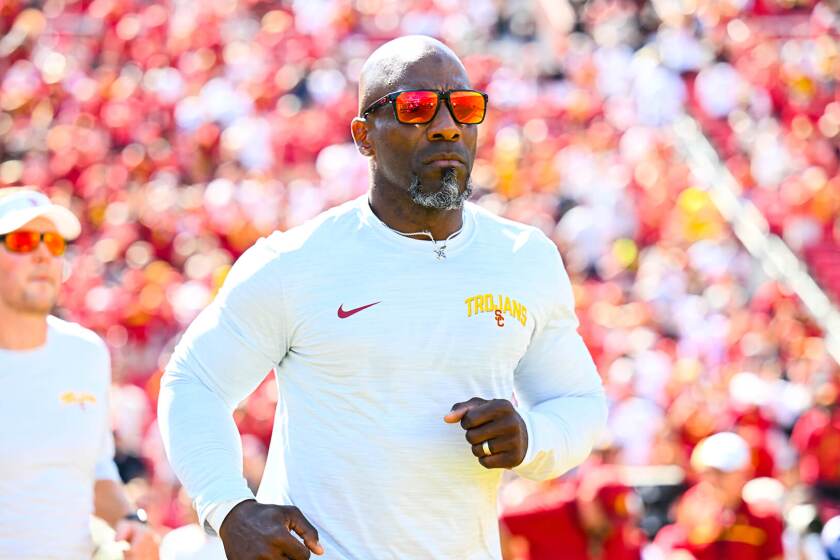Finding a Boost in a Pill
- Share via
Some days last season, Petros Papadakis awoke feeling too tired, too bruised to face practice. The USC tailback needed a lift to get him through the day.
So he turned to something he could buy from a nutrition store in a shopping mall.
They were pills that combined caffeine with aspirin. Papadakis, his college career now over, says many of his teammates took such pills as well as other dietary supplements that promised to enhance health and boost energy.
“It’s all over-the-counter stuff,” he said. “At least half the guys on the team were on supplements.”
Now, Papadakis has second thoughts about what he and his teammates put into their bodies. He has read in the newspaper that three players who recently died on the field--including Northwestern safety Rashidi Wheeler and Florida State’s Devaughn Darling--were allegedly taking supplements.
There is no proof that supplements played a role in any of the deaths.
Such products fall into a gray area, neither a food nor a performance-enhancing drug. Sold under names such as Ripped, Fuel and Ultimate Orange, they are used safely by millions of Americans, but experts warn that they can create health risks under certain circumstances, such as when combined with other medications or strenuous activity.
USC administrators doubt 50% of last season’s football team was using supplements, but they know it is a worrisome issue on campuses nationwide. Each fall, the athletic department invites a professor from the pharmacy school to address athletes.
The message is twofold: Some over-the-counter products contain ephedrine, a stimulant banned by the NCAA. Others, while perfectly allowable, might pose a health risk.
But Papadakis said the university has little control over what players ingest.
“A guy’s 22 years old and if he wants to go to the store and buy it, who’s going to stop him?” Papadakis said. “The USC people would never know anything about it.”
Such is the nature of football that players always search for a competitive edge, he said. At Palos Verdes Peninsula High, he watched teammates mix supplements with larger-than-recommended doses of Advil before games “and their nose would start bleeding.”
Papadakis recalled loading up on Advil before a game but felt ill and never tried it again. Later, he tried creatine, advertised as a strength booster. His muscles quickly thickened but, again, he felt too sick to continue the regimen.
At USC, he said, “some guys didn’t take anything. They wouldn’t even drink a beer after the game. But then there’s the other half, the guys who would take something to get through practice.”
Some of those players were careful, seeking advice from teammates considered to be well-versed on supplements. Others mixed various supplements without any knowledge of how the ingredients might interact.
Add a night of drinking and a rigorous drill the next day and, Papadakis said, “you don’t know what might happen.”
“Guys think they are being tough,” he said. “But they’re dumb.”
Papadakis quickly counts himself among the uneducated, at least in one instance last season.
Feeling the aches and pains of the previous week’s game, he took three caffeine-aspirin pills one morning before practice. “It’s like drinking two cups of coffee,” he said. He was also suffering from a bronchial infection, which meant he was using his asthma inhaler more often than usual.
Running plays against the scout team that afternoon, Papadakis began to feel strange. His heart fluttered so quickly that it frightened him. He asked an assistant coach to put a hand on his chest and asked: “Does this feel normal?”
“No,” the assistant replied. “Get off the field.”
As a senior and co-captain of the team, Papadakis had no qualms about leaving.
He suspects not all players would think likewise.
“When you’re an 18-year-old freshman,” he said, “you’re scared to pull yourself out of practice.”
Russ Romano, the USC athletic trainer, kept him under observation until his heart rate returned to normal.
“Russ is really thorough,” Papadakis said. “I have to say one thing about USC: If they think you have a problem with something, they will confront you.”
Again, Papadakis speaks from experience. In 1999, he suffered a badly broken foot that required numerous surgeries. That meant playing the 2000 season in constant pain.
At one point, Romano pulled him aside and told him he was taking too many pain pills after games.
“I scoffed at him,” Papadakis said. “But I went home and thought it over. He was right.”
Romano and the university’s new strength coach, Chris Carlisle, have been just as vocal about supplements, going so far as to ask that no caffeinated soft drinks be served at the training table.
“The climate is changing,” Romano said, but he adds: “It’s a slow process.”
Papadakis wonders if the news reports about Wheeler and Darling might speed things up.
“For the most part, guys use this stuff and it slips under the radar because nothing bad happens,” he said. “But if guys could be better educated, at least some dudes might see that maybe they are doing something wrong.”
More to Read
Go beyond the scoreboard
Get the latest on L.A.'s teams in the daily Sports Report newsletter.
You may occasionally receive promotional content from the Los Angeles Times.






